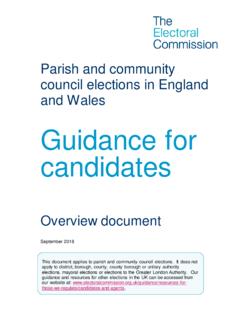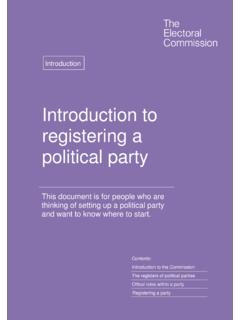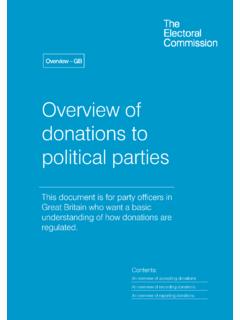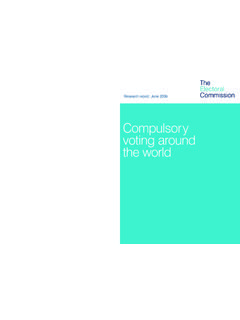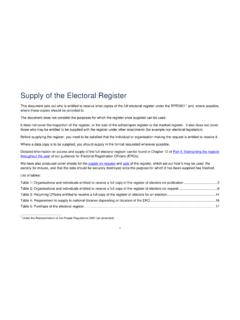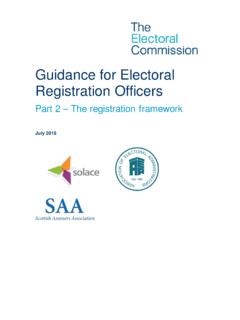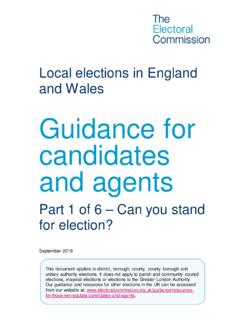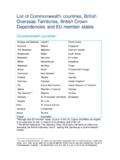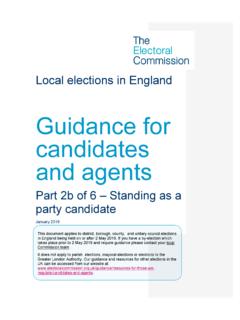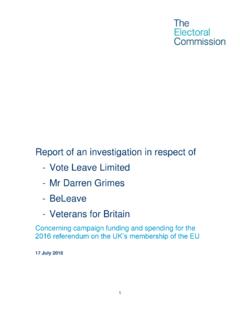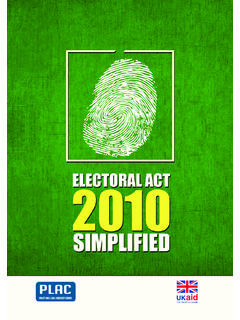Transcription of Scottish independence referendum ... - Electoral …
1 Scottish independence referendum Report on the referendum held on 18 September 2014 December 2014 ELC/2014/02 This report is laid before the Scottish Parliament in pursuance of Section 27 of the Scottish independence referendum Act 2013. ELC/2014/0 2 Translations and other formats For information on obtaining this publication in another language or in a large-print or Braille version please contact the Electoral Commission: Tel: 020 7271 0500 Email: We are an independent body set up by the UK Parliament. We regulate party and election finance and set standards for well-run elections. We work to support a healthy democracy, where elections and referendums are based on our principles of trust, participation, and no undue influence.
2 The Scottish independence referendum Act 2013 gave the Commission a number of responsibilities for the referendum , for which we report directly to the Scottish Parliament. Contents Foreword 1 Executive Summary 4 1 Introduction 22 2 The referendum legislation 28 3 Information for voters about the referendum 42 4 The experience of voters 58 5 Campaigning at the referendum 82 6 Was the referendum well-run? 119 7 The cost of the referendum 145 Appendices Appendix 1 - Research methodology 150 Appendix 2 - List of registered campaigners 151 Appendix 3 - Summary of referendum results 152 Appendix 4 - Electoral Commission Voting Guide 154 1 Foreword As part of the legislation passed by the Scottish Parliament enabling the historic referendum on independence for Scotland on 18 September 2014, the Electoral Commission was tasked with producing a report on the conduct of the referendum and our associated expenditure.
3 This report fulfils that duty. It provides a comprehensive overview of the issues relating to the referendum , from the passage of the legislation through to the conduct of the poll. It looks at the key issues that arose on the way to polling day, including the conduct of campaigners and our regulation of them, and provides data on the views of voters and the experience they had throughout this period. First of all, I am pleased to report that the referendum was well run. At , turnout at the referendum was the highest recorded at any Scotland-wide poll since the advent of universal suffrage. In addition, 10% of the voters we spoke to reported that the referendum was their first experience of voting at any statutory poll.
4 And voters were happy with their experience of the Electoral process. 94% of people who voted in polling stations, and 98% of those who voted by post, reported to us that they were satisfied with this. The report provides an opportunity to recognise and applaud those responsible for administering the referendum , from the Chief Counting Officer, Mary Pitcaithly, to all of the Counting Officers and Electoral Registration Officers across Scotland, who all rose to the challenges posed. From registering almost 150,000 voters in the last month before the deadline, to managing the record number of votes cast on polling day, their commitment and hard work ensured that voters across Scotland took part in an effective and efficient poll.
5 There was of course a number of reasons why the referendum was historic, one of which was the expansion of the franchise to include 16 and 17 year olds for the first time. This referendum showed that for young people, indeed for all voters, when they perceive an issue to be important and are inspired by it, they will both participate in the debate and show up on polling day. This is borne out by the figures. 109,593 16 and 17 year olds were included on the registers by the registration deadline and 75% of those we spoke to claimed to have voted. Importantly, 97% of those 16-17 year olds who reported having voted said that they would vote again in future elections and referendums. The voting process worked for them and thanks to the professionalism of Electoral staff across Scotland their experience was positive.
6 The challenge for political parties across Scotland is to keep them engaged and enthused. An important lesson from the experience in Scotland, 2 that others looking to extend the franchise should consider carefully, is that to do this well it is important time is given both for administrators to do targeted activity to register young people and for campaigners to engage with them. The Commission itself had a number of roles at the referendum . As well as supporting the Chief Counting Officer and administrators across Scotland throughout the referendum period, we were also responsible for registering campaigners and regulating the campaign spending and reporting rules they operated under.
7 In total the Commission registered 42 campaigners, with 21 registering in support of a Yes outcome and 21 in support of a No outcome at the referendum . For the first time at any referendum , campaigners had to report their donations to the Commission before the poll. This meant that we were able to publish the details of campaign donations totalling million, giving voters access to that information before they went to vote. We welcome the transparency this brought for voters and the overall level of compliance from campaigners in meeting this new requirement. Stepping back to the start of the process, the crucial role played by the Scottish Parliament in passing the referendum legislation as early as possible should also be acknowledged.
8 In sharp contrast to the referendums in 2011 where the rules were confirmed only three months ahead of polling day, the Scottish independence referendum Act was passed nearly nine months ahead of the poll. This ensured that there was adequate time for those administering the poll to prepare for delivering their respective roles at the referendum . It also allowed campaigners to familiarise themselves with the campaign rules and ensure they had adequate processes in place to comply with them. Future referendum legislation should be delivered to a similar timetable and standard as this Act. There are some other important lessons that could be learned from the experience in Scotland. As well as the timeliness of the legislation, it was clear that holding a poll on such an important constitutional issue on a separate day from other elections helped both administrators and campaigners plan their activity more effectively and gave voters space to understand the issues.
9 We have previously recommended that combining a referendum with other polls should be considered on a case-by-case basis. We believe that this remains the case, but that for issues of a similar scale, for instance about the UK s membership of the European Union, the example set in Scotland should be considered carefully. 3 Finally, I would like to acknowledge the important role played by the Electoral Management Board of Scotland in helping ensure the success of the referendum . The Board provided a crucial role in advising, supporting and guiding the work of all those administering the referendum . We have previously recommended that the EMB s role should be placed on a statutory footing for all parliamentary elections in Scotland and continue to believe that this is the case.
10 We would welcome this change being considered as part of the wider Electoral changes proposed by the recent publication of the Smith Commission s proposals. We welcome the Parliamentary scrutiny of this report and look forward to discussing our findings and recommendations with the Devolution (Further Powers) Committee. John McCormick Electoral Commissioner 4 Executive Summary About this report On 18 September 2014, the people of Scotland voted in a referendum on whether Scotland should be an independent country. In the months leading up to the day of poll Scotland was energised by the debate and the voters engaged in the discussion around the referendum question. The question asked, to which voters were required to vote either yes or no, was: Should Scotland be an independent country?
